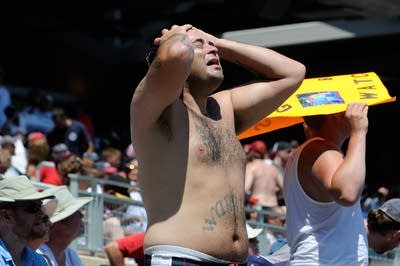Heat-related illnesses a concern

Emergency departments across Minnesota are bracing for a spike in patients with heat-related illnesses this week. Twin Cities metro area hospitals have already treated numerous patients for dehydration and other ailments brought on by the excessive heat.
It's a dangerous situation, especially for children and older people and anyone else exposed to the heat for an extended period of time.
Oscar Rodriguez says he's used to hot weather after spending the better part of his life in Mexico. But today it brought Rodriguez, 35, to his knees. He had just finished a short lunch break at his construction job when he tried to stand up to go back to work.
"I just started feeling bad -- shaky, dizzy and I can't walk," he said.
Create a More Connected Minnesota
MPR News is your trusted resource for the news you need. With your support, MPR News brings accessible, courageous journalism and authentic conversation to everyone - free of paywalls and barriers. Your gift makes a difference.
Rodriguez had spent a busy morning tearing the ceiling out of a building that didn't have air conditioning. To protect himself from dust, he wore a synthetic body suit that made him even hotter.
"I started sweating a lot, and I think that's what happened," he said.
Rodriguez went to the emergency room at Regions Hospital in St. Paul to get treatment. Resident Adetolu Oyewo started pumping Rodriguez full of intravenous fluids. She says he had the classic symptoms of heat exhaustion.
"It can happen very quickly because it's a matter of physiology and how the body works," she said. "It's important that once you start noticing symptoms, that you take a break from what you're doing and get in somewhere that's cooler."
So far, Regions has treated eight patients with either heat exhaustion or a less serious heat-related illness since the weekend. No one has turned up yet with heat stroke, a life-threatening condition caused by the body's inability to sweat. Complications from heat stroke are what caused the death of offensive tackle Korey Stringer at Vikings training camp 10 years ago.
Some fans at Target Field in Minneapolis succumbed to the hot weather Monday afternoon during the first game of a doubleheader with the Cleveland Indians. At least a couple dozen people needed to be treated at the ballpark for heat ailments, and a few were taken to a hospital, according to team spokesman Kevin Smith.
The Twins provided free water stations at the gates and other locations around the outdoor ballpark where fans could fill water bottles.
Felix Ankel, an emergency medicine physician at Regions Hospital, said he expects it will get much busier in his department in the days ahead as the oppressive heat and humidity continues.
"If anybody's been in a sauna, a short amount of heat you can probably take," he said. "It's how long you've had that heat. And it's not only the heat, but it's how your body stays hydrated with that. And so I think if people under-hydrate themselves for a few days, they will have more and more symptoms."
The problem is people often don't recognize that they're dehydrated, especially if they've continued to drink their usual amount of fluids. Ankel says a good rule of thumb is to consume the same amount that you lose.
"The most scientific way is put yourself on a scale, and if you're weighing 150 pounds on Monday and 146 on Tuesday, many of those four pounds are fluids."
Physicians don't recommend drinking alcohol to beat the heat because it speeds up dehydration. Water is fine, but beverages that contain salt and sugar are better because they help replace lost nutrients.
Taking it easy is also important. But even that's no substitute for cooler temperatures.
Dr. Douglas Brunette is a hyperthermia expert at Hennepin County Medical Center in Minneapolis. He says some people may not realize they're predisposed to heat-related illnesses.
"You certainly can get heat illness just sitting there," Brunette said. "The heat index today is well over 100. And if you don't stay hydrated and if you're young or old or on some medications, you can develop heat illness or heat stroke."
Drugs that can aggravate heat-related problems include some forms of medication that are used to treat high blood pressure, psychiatric conditions and allergies.
An excessive heat warning remains in effect for central and southern Minnesota though Wednesday evening. The northern part of the state is under a heat advisory.
(The Associated Press contributed to this report)
